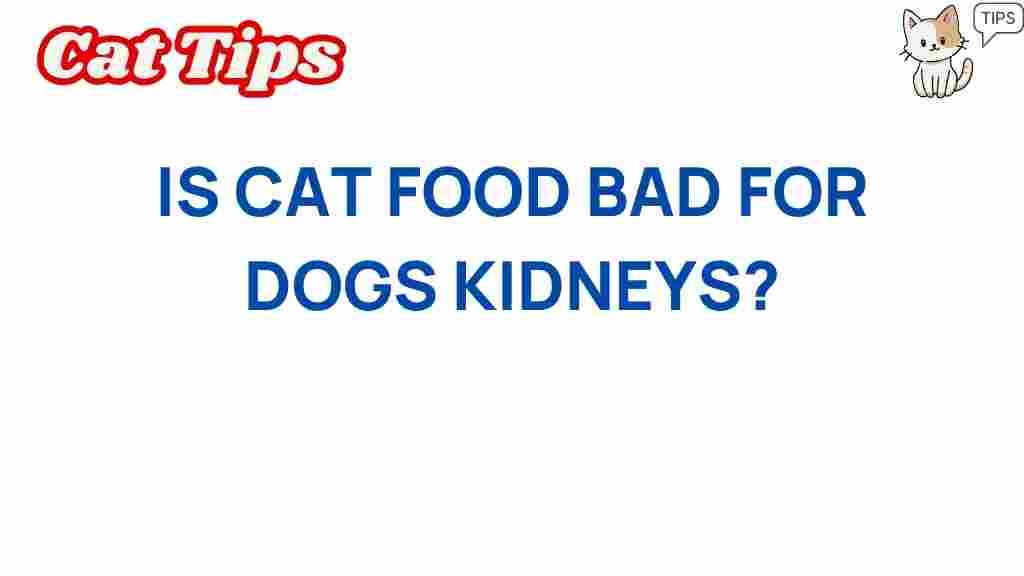Is Cat Food a Hidden Danger to Your Dog’s Kidneys?
When it comes to feeding our beloved pets, it’s essential to provide them with the right nutrition tailored to their species. However, many dog owners may find themselves in a situation where their dog has gotten into the cat food. This scenario raises an important question: is cat food a hidden danger to your dog’s kidneys? In this article, we will explore the differences between cat food and dog food, the potential risks associated with feeding your dog cat food, and what you can do to keep your dog’s kidneys healthy.
Understanding the Nutritional Differences
Before delving into the implications of cat food for dogs, it’s crucial to understand the nutritional differences between cat food and dog food.
- Protein Content: Cat food typically has a higher protein content than dog food. While dogs are omnivores and can thrive on a balanced diet of proteins, carbohydrates, and fats, cats are obligate carnivores that require a meat-based diet.
- Taurine: Cat food contains taurine, an essential amino acid that is crucial for cat health but not necessary for dogs. Dogs can synthesize taurine from other amino acids.
- Fats: Cat food often has higher fat levels, which can lead to obesity and pancreatitis in dogs if consumed regularly.
- Vitamins and Minerals: The vitamin and mineral composition of cat food is designed for felines and may not meet the specific needs of dogs, potentially leading to deficiencies or excesses.
The Risks of Feeding Your Dog Cat Food
Feeding your dog cat food on a regular basis can pose several health risks, particularly to the kidneys. Here’s why:
- Kidney Stress: The high protein and fat content in cat food can put undue stress on your dog’s kidneys. Dogs’ kidneys process different waste products, and excessive protein can lead to increased workload.
- Obesity: The higher calorie density of cat food can contribute to weight gain in dogs, which is a significant risk factor for kidney disease.
- Pancreatitis: Dogs can develop pancreatitis from consuming the high-fat content found in cat food, leading to serious digestive issues and long-term health problems.
- Imbalance of Nutrients: A diet high in cat food may lead to nutrient imbalances, as dogs require different vitamins and minerals than cats do.
Signs of Kidney Issues in Dogs
Being aware of the signs of kidney problems in dogs is essential for early intervention. Common symptoms include:
- Increased thirst and urination
- Loss of appetite
- Weight loss
- Vomiting
- Lethargy
- Bad breath or a change in breath odor
If you notice any of these symptoms, it’s crucial to consult your veterinarian promptly.
Steps to Prevent Your Dog from Eating Cat Food
To ensure your dog stays safe and healthy, consider the following strategies to prevent them from accessing cat food:
- Feeding Schedule: Establish feeding times for both your cats and dogs. Serve the pet food at different times to minimize the chances of one getting into the other’s food.
- Separate Feeding Areas: Designate separate feeding areas for your pets. Consider placing cat food on elevated surfaces that are out of your dog’s reach.
- Supervision: Always supervise your pets during feeding times. Keep an eye on your dog to prevent sneaking cat food.
- Use Pet Gates: If possible, use pet gates to restrict your dog’s access to areas where cat food is located.
Troubleshooting Tips if Your Dog Eats Cat Food
What should you do if your dog has already indulged in cat food? Follow these troubleshooting tips:
- Monitor Your Dog: Keep a close watch on your dog for any signs of distress or unusual behavior.
- Hydration: Ensure your dog has access to fresh water. This helps flush out their system and can alleviate some strain on their kidneys.
- Consult Your Veterinarian: If your dog consumes a significant amount of cat food or shows any adverse symptoms, contact your veterinarian for advice.
- Adjust Diet Gradually: If your dog has been eating cat food for an extended period, transition back to a balanced dog diet slowly to avoid digestive upset.
What to Feed Your Dog Instead
To promote your dog’s kidney health and overall well-being, provide them with a balanced diet designed specifically for dogs. Consider the following options:
- High-Quality Dog Food: Choose dog food with a good balance of proteins, fats, and carbohydrates suited for your dog’s age, size, and activity level.
- Consult a Veterinarian: Your vet can recommend the best diet for your dog, especially if they have any pre-existing health conditions.
- Homemade Dog Food: If you’re inclined to prepare homemade meals, ensure they are nutritionally balanced. Consult a vet or a pet nutritionist for recipes.
Conclusion
In summary, while the occasional nibble of cat food may not be immediately harmful to your dog, regular consumption can lead to serious health issues, particularly concerning kidney function. Understanding the nutritional differences between cat food and dog food is essential for any pet owner. To keep your dog healthy, it’s crucial to provide them with a proper diet and take proactive steps to prevent them from eating cat food.
If you’re facing issues with your dog’s diet or want to learn more about keeping your furry friend healthy, consult your veterinarian or check out pet nutrition resources. Remember, a well-fed dog is a happy dog!
For more information on pet care and nutrition, visit our pet health blog.
This article is in the category Health and created by CatTips Team
